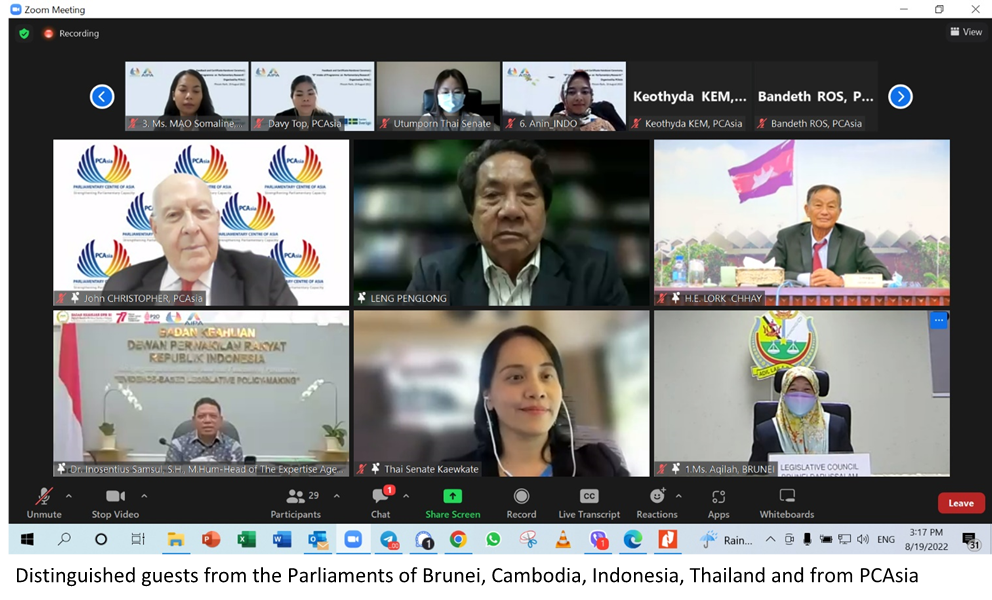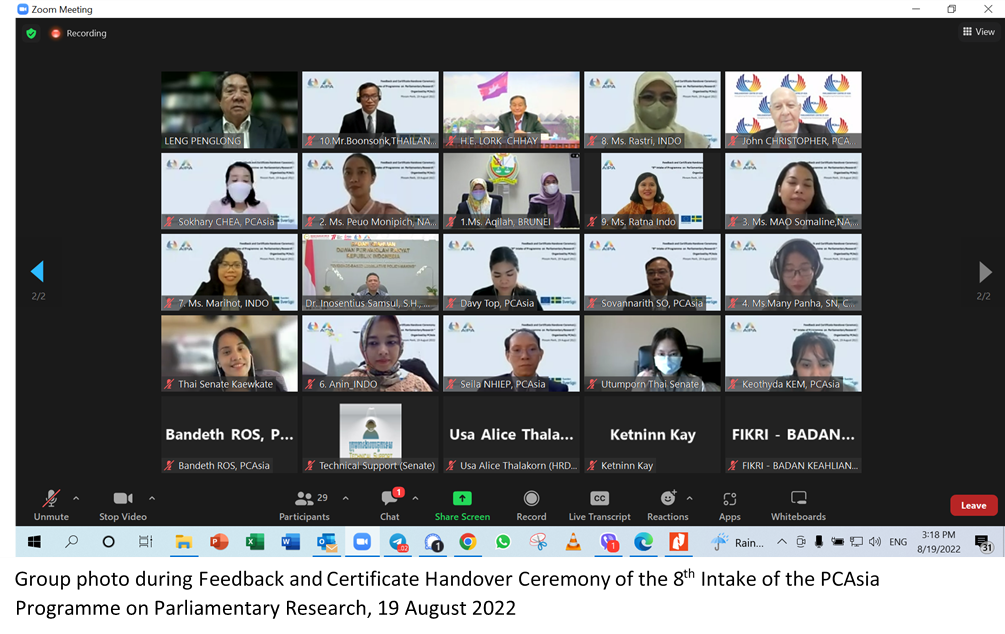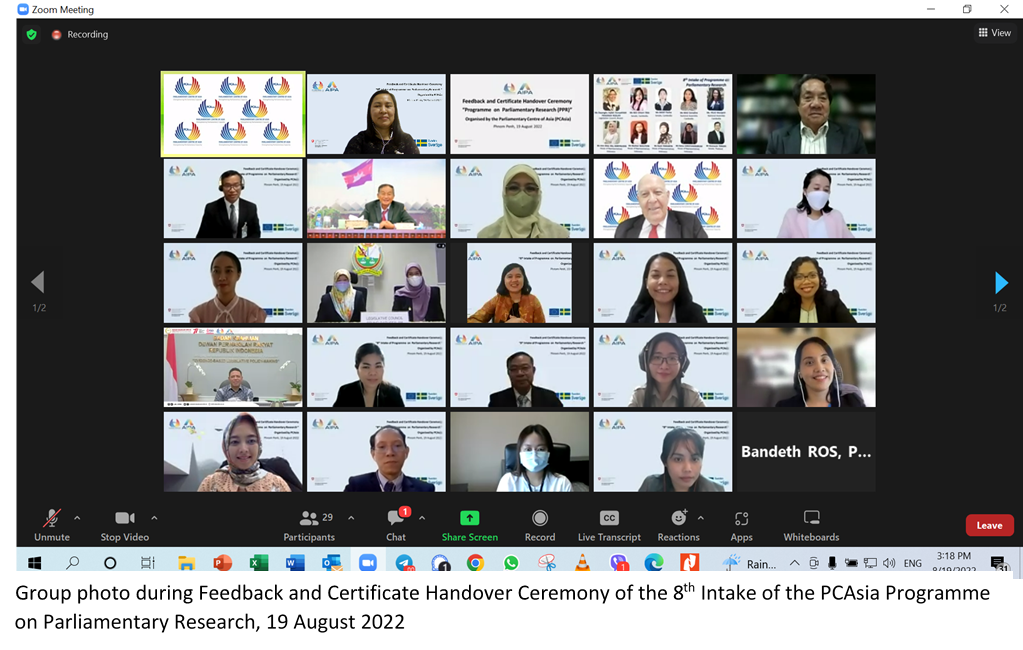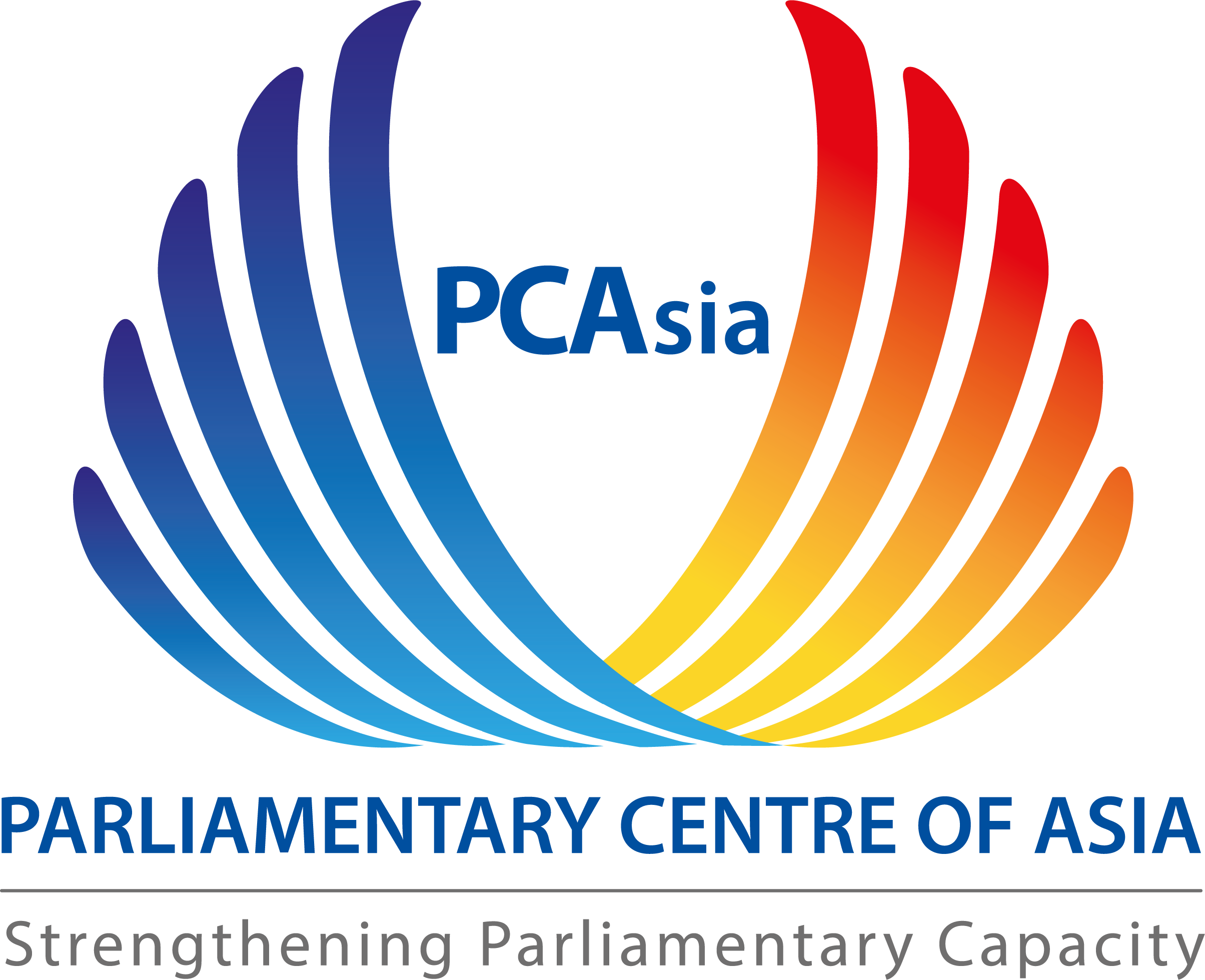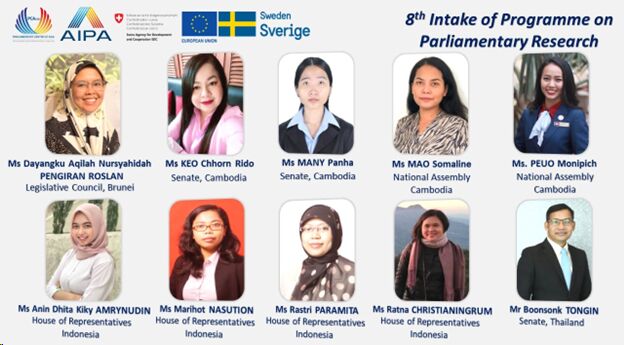Phnom Penh, August 19, 2022: After a three-month training, August 19 marked the end of the 8th intake of the PCAsia capacity development Programme on Parliamentary Research. Upon the successful completion of the online training by the 10 participants who joined the program from the parliaments of Brunei, Cambodia, Indonesia, and Thailand, a certificate ceremony was held in recognition of their efforts, active engagement, and commitment. The event was attended by distinguished guests and representatives from the Parliaments of Brunei, Cambodia, Indonesia, and Thailand, along with the Director of the Capacity Development Department of PCAsia, and PCAsia instructors.
The Programme on Parliamentary Research aims to improve the technical knowledge and skills of parliamentary officials to support parliamentarians with up-to-date and evidence-based information for effective parliamentary decision-making to analyse, amend, and draft legislation, as well as to perform their representation and oversight functions.
Having completed the programme, the trainees gave thanks to the instructors who provide support in all the processes of developing concept notes, writing briefing notes and sharing their findings at the Regional Seminar held on August 10, 2022. They also shared a few suggestions for improving the training including increased engagement and interaction with the other trainees, and that network building and knowledge sharing would be enhanced by face-to-face training.
As part of their practical training, participants were encouraged to select a research topic from the two themes “Strengthening Parliamentary Partnership in Addressing Climate Change” and “Enhancing Digital Transformation for Social Protection”, then to develop a concept note and write the briefing note. Mr. So Sovannarith, who manages the programme, remarked on the relevance of climate change issues and the expansion of social protection to the current policies of the trainees’ respective countries. He continued on the role of legislative bodies, which can include mobilizing resources to help the people affected and supporting resilient policy actions. He also noted some common challenge faced by the researchers in developing countries, including the limited availability of data on current initiatives and a lack of established best practices.
Mr John Christopher, PCAsia Capacity Development Director, congratulated the trainees for their contribution to the success of this three-month training course, who in the programme’s 8th intake, join a total of 126 officials from the Parliaments of Cambodia, Indonesia, Lao PRD, Malaysia, Myanmar, Thailand, and the Philippines to have successfully completed this training. In so doing they have developed pragmatic research knowledge and skills through PCAsia’s “learning by doing” approach, the aim of which is to help develop autonomous parliamentary researchers, equipped with the tools to produce research for their respective parliamentarians that exhibits objectivity, balance, timeliness, and impartial information while integrating a human rights-based approach and gender mainstreaming into the work.
Representatives from Brunei, Cambodia, Indonesia and Thailand offered congratulatory remarks to the successful trainees while noting how the training is relevant to their work and how it also provides an opportunity for network building between the staff of AIPA Member Parliaments. H.E. LENG Penglong, Secretary General of the National Assembly of Cambodia, remarked that trainees can apply their skills to assist in providing memoires, document analyses, and other texts on legal, economic, social, and cultural matters for MPs, relevant parliamentary commissions, and the General Secretariat of the National Assembly, especially in preparation for the upcoming 43rd ASEAN International Conference.
H.E. LORK Chhay, Deputy Secretary General of the Senate of Cambodia, shared his appreciation for PCAsia’s capacity development programmes that have made a significant contribution to human resource strengthening and establishment of the Research Department of the Cambodian Senate, and his wishes that PCAsia will continue to support AIPA and its Member Parliaments.
Dr Inosentius Samsul, Head of Parliamentary Expertise Agency of the Secretary General of the House of Representatives of the Republic of Indonesia, congratulated all trainees on their efforts and encouraged them to apply what they have learned in their research for the legislature. He next thanked the other parliaments and PCAsia for sharing such valuable experiences on evidence-based policy making, and for contributing to the support the human resource improvements required by the House of Representatives of the Republic of Indonesia. He remarked that the Certificate Ceremony marks the end of the training, but the cooperation and collaboration among the trainees will remain.
Ms Kaewkate THAWORNPHUN, advisor on Legislative Procedure of the Senate of the Kingdom of Thailand, thanked the efforts of the instructors and trainees for contributing to the practical improvement of parliamentary research skills. She shared her belief that the training programme will therefore help to support the representative, legislative, and oversight functions of participating Parliaments. She closed by stating that the Thai Senate will continue to provide support to PCAsia’s training programmes, which are beneficial to both the skill of parliamentary staff as well as to the strengthening of friendship among AIPA Member Parliaments.
